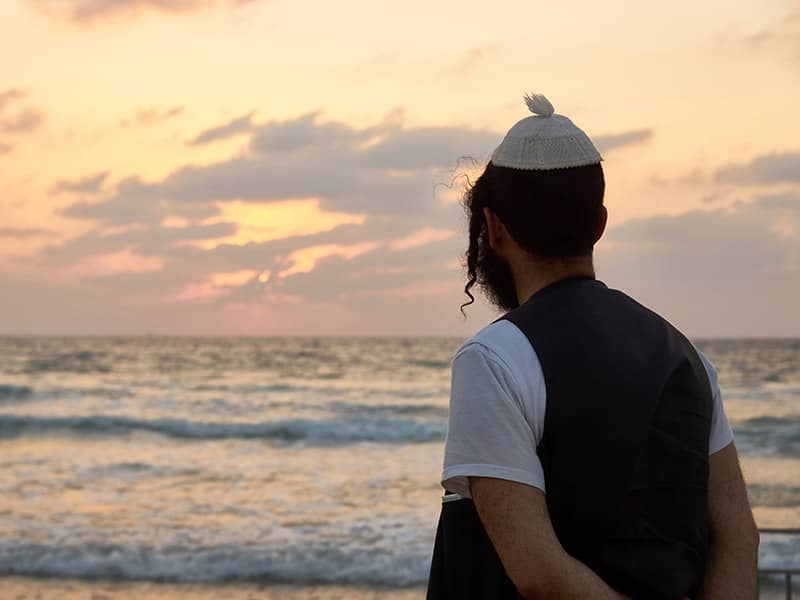Every time I park my car on the streets of New York (not often) and return to find it where I left it--not only not stolen but unscratched--I feel like saying a special blessing of thanksgiving.
A New York miracle.
Is there a place in our tradition for spontaneous prayer?
Our rabbinic sages composed beautiful prayers of gratitude for so many occasions, from grace after meals, recalling God's bounty that sustains us, to the blessing recited on seeing a rainbow, reminding us that God honors the covenant made with Noah after the Flood. By marking a wide range of events for blessings, from everyday occurrences (like eating or relieving oneself), to the marvels of nature (on seeing lightning or hearing thunder), the rabbis were teaching us to connect all of life's wonders, small and large, to God. They also underscored that prayer was not limited to the traditional morning, afternoon and evening services that date back to the post-Temple period, when our sages sought a new form of communication between man and God to replace the biblically mandated animal sacrifices and rituals performed in our holiest site.
In that spirit, why not add prayers relevant to situations that are part of our modern existence? They could range from words of gratitude on learning of a new medical technique that can restore health or save lives to a rite-of-passage on watching one's teenage child heading off alone in the family car for the first time after getting a driver's license - in many ways more a sign of adulthood today than bar or bat mitzvah.
Truth is, there is a dichotomy in the prayers I recite each day. Most are the traditional verses of the Siddur, beautifully written, in praise of God's wonders, ancient and eternal. Too often I utter them in haste, sometimes by rote, with my mind wandering in different directions. Occasionally, though, the power of the words or the appropriateness of my petition take them to a higher level, I pray - literally.
Then there are what I think of as my private, or ad hoc prayers, unwritten and unformed, that come to mind in the course of a day. They could be a quick thank-you for a difficult situation overcome or averted; a moment of gratitude, after talking to (or e-mailing with) my children or other loved one, for the blessing of their presence in my life; or a petition for comfort for a newly aggrieved Israeli family, after learning of the latest Palestinian attack.
Much has been written about the nature of prayer, not only as an opportunity to make requests of God but as a process of self-reflection and understanding, a means of connecting with our innermost feelings, and a discipline that helps us keep our egos and desires in check. Such writings help us appreciate the self-evaluation that is part of prayer, the attempt to improve ourselves through devotion to our Creator.
Now comes Naomi Levy, a Conservative rabbi in Venice, Calif., who has written a simple but powerful book of personal prayers, "Talking To God" (www.aaknopf.com), encouraging us to formalize our own thoughts by writing them down, and inspiring us with her own words as a guide to dealing with a range of contemporary situations, including surgery, marital troubles, rebellious teens and menopause.
Her words are wise and clear and her approach is straightforward. Here, for example, is her short prayer for those seeking the ability to communicate with God: "Open my eyes, God. Help me to perceive what I have ignored, to uncover what I have forsaken, to find what I have been searching for. Remind me that I don't have to journey far to discover something new, for miracles surround me, blessings and holiness abound. And You are near. Amen."
"People have such a strong desire to communicate with God and yet have problems doing that in the synagogue," Rabbi Levy said in an interview. "Too many people ask their rabbis to pray for them and feel their own prayers are unworthy."
She sees part of her job as entreating congregants, and others, to do what she has done. In the introduction to her book, Rabbi Levy explains that she started writing her own prayers when she was pregnant with her son. Filled with hope and worry, she started talking to God each day, "and soon I was writing down new prayer after prayer. And I have never stopped." She says the process has brought her joy and comfort and calmed her fears. "I could talk to God in plain English, without any pretense. I could enter into an intimate relationship with God."
She says she now receives requests from rabbis to do prayer-writing workshops with congregants, and is pleased that the Stephen Wise Temple in Los Angeles, one of the nation's largest congregations, is distributing her book in its pews.
By sharing her own thoughts, fears and dreams and addressing situations both profound and ordinary, Rabbi Levy gives us permission to think about encountering God, not just to ask for help in times of stress, but to reclaim prayer for ourselves in an informal, intimate form.
Prayer did not come from Sinai, she reminds us; the rabbis of old were responding to the needs of the time. Similarly, in a classic chasidic story, a rebbe is asked where God can be found. "Wherever we let Him in," the rebbe answers.
The choice is ours, then, and is not mutually exclusive. We can pray from our Siddur and we can pray from our hearts.

